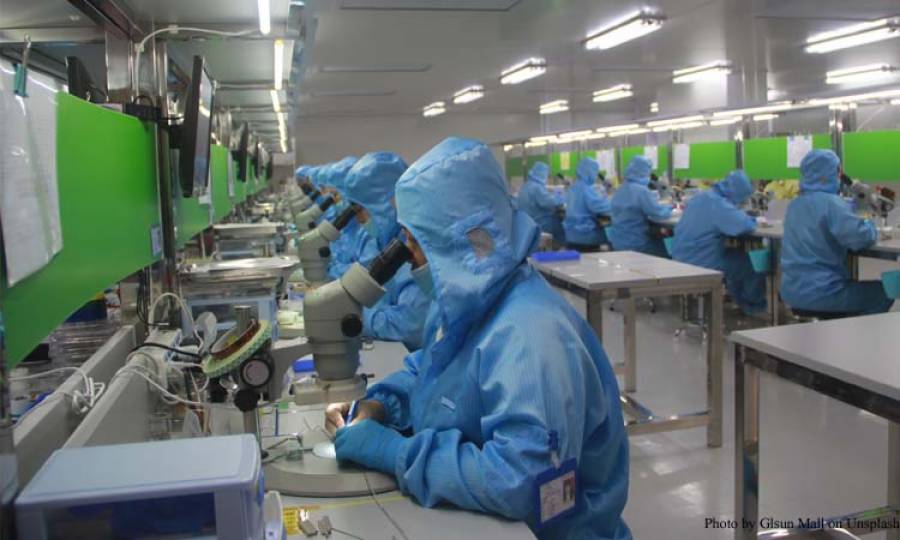Pharma industry labour facing exploitation in Pakistan

KARACHI: National Trade Unions Federation (NTUF) and pharmaceutical industry workers highlighted the violation of human rights by pharmaceutical industries.
In Pakistan, workers in the pharmaceutical industry face the worst exploitation and industry owners. Despite earning billions of rupees, the companies were not ready to give fundamental labour rights to these workers, stated labour leaders, addressing a press conference arranged by the National Trade Unions Federation and workers of the Pharmaceutical industry at the Karachi Pakistan Club (KPC).
Nasir Mansoor, NTUF, Rafiq Baloch NTUF, Manzoor Ahmed, Martin Dow Market Workers Union, Bakht Zameen, Hilex Pharma Employees Union, Farman Khan, Asprin Pharma Workman Union, Muhammad Kashif Khan GlaxoSmithKline (GSK) Workers Union, and others expressed their views.
They said the pharma industry was amongst the sectors that made the most profits during the COVID-19 pandemic. They also got huge incentives and benefits from the government. However, the workers of this sector faced the worst working condition.
They said that the prices of medicines in Pakistan were hiked by 311 per cent, and more increase is expected in the upcoming mini-budget. Presently, in Pakistan, more than 700 pharmaceutical companies are also exporting drugs to more than 60 other countries. Their annual sale was more than Rs560 billion, and it is increased at the rate of 15 per cent per annum.
They spotlighted that more than 0.1 million workers were directly related, and one million people were indirectly related to this sector.
They asserted that as per local and international laws, workers of all categories had the right to make their labour unions, and the Supreme Court had also ratified it. However, the pharma sector workers were still deprived of this right.
They claimed that the nature of jobs in the pharma sector was that of permanent work, but 90 per cent of its workforce is compelled to work on a temporary basis. The illegal contract labour system was present in almost all factories, and medicines were being made in unhygienic conditions that were anti-humane. These factories were virtual sweatshops. Their production process was being outsourced in dangerous COVID-19 conditions to utterly unhygienic places. It also poses threats to workers and the users of these products.
They enlightened that most workers in the pharma sector were not issued social security and EOBI cards. The workers' contribution to SESSI and EOBI was deposited through contractors, so as that relates to the industry could not be established.
They articulated that the Supreme Court had already decided that all industries related to the life-saving sector would hire permanent employees, but the court's verdicts are not being implemented.
The institutions like social security, EOBI and workers welfare boards have become the dens of corruption. They said the workers' welfare board is badly marred with corruption, where dowry grant, education scholarship and even death grant was not issued without taking bribes.
They highlighted that houses of the workers' welfare board were allotted in 2013, but despite the passage of nine years, their possession was yet to be given to the workers. These houses were not livable as they had no water, power or gas facilities.
They said that in other provinces, the dowry grant was increased from Rs100,000 to Rs200,000; death grant from Rs500,000 to Rs600,000 and educational scholarship, money for shoes and pocket money was doubled. They asked that the workers of Sindh should also be given these facilities.
On occasion, the union of pharma sector workers announced to wage a struggle from the platform of NTUF for their rights in this regard. On February 15, an All Pakistan Pharma Workers Conference would be organised to launch a movement to realise their rights.
They demanded that the pharmaceutical industry workers should be given the right to make their labour unions. Contact labour system should be ended, and as per the decision of the Supreme Court, the workers of the life-saving sector should be made permanent. EOBI and social security contributions should be recovered from the companies instead of contractors, and cards in the name of workers should be issued. The illegal practice of appointing temporary workers in the name of PSOs should be ceased.
Trending
Popular
Researchers warn of allergy risks posed by insect-based foods
-
WHO’s mRNA bird flu vaccine ...
02:30 PM, 31 Jul, 2024 -
University of Wollongong cancer ...
10:00 AM, 31 Jul, 2024 -
JSMU lauds Dr Waqas for research ...
05:30 PM, 26 Jul, 2024 -
Revolutionary HIV drug can drastically ...
06:30 PM, 25 Jul, 2024




